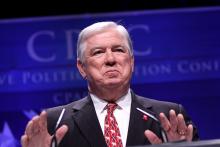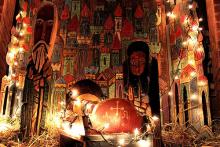Redemption
A VARIETY OF EVANGELICAL peacemaking efforts have sprung up in recent years, from the Two Futures Project, which seeks a world without nuclear weapons, to the World Evangelical Alliance’s Peace and Reconciliation Initiative, which seeks to redress the fact that “in our zeal for evangelism, we have often overlooked the biblical mandate to pursue peace.”
This fall, evangelicals from a range of viewpoints gathered at Georgetown University in Washington, D.C., exploring what a distinctive evangelical contribution to peacemaking might look like. The essays below, unless otherwise noted, are taken from the first Evangelicals for Peace conference, a “summit on Christian moral responsibility in the 21st century.” Organizers hope to publish a book with the entire collection of talks. —The Editors
-----
‘All the Easy Jobs Have Been Done’
Standing on a rich tradition of peace and transformation
by Geoff Tunnicliffe
WHY IS PEACEMAKING an important topic for evangelicals? As a global community of 600 million Christians, our churches are confronted daily with the impact of illegal weapons. Our hospitals treat the victims of violence. Our church leaders counsel the traumatized. All forms of conflict negatively impact our development programs. Our aid agencies seek to care for and rehabilitate child soldiers. Our inner-city communities are confronted with the outcomes of gang warfare.
For all of us who say we are followers of Jesus, as we observe or experience the brokenness of our world, it should break our hearts. If we feel the pain so deeply, I can’t imagine what our loving God feels. The One who is called the Prince of Peace. The One who laid down his life, so that we could be reconciled to God and each other.
The World Evangelical Alliance’s engagement in peacemaking stands on the rich traditions of evangelicals who have devoted themselves to being instruments of social change and transformation. We want to say loudly that we evangelicals want to be on the forefront of peacebuilding. All the easy jobs have been done. It’s just the tough ones that are left. It requires clear vision to face these challenges.
We as evangelicals are committed to working together with those in and outside our community for the good of all. May God empower us through the work of his Spirit to be his ambassadors of peace and reconciliation.
EARLY IN J.R.R. Tolkien's The Fellowship of the Ring, Gandalf the wizard is talking with the hobbit Frodo Baggins about the dreadful Gollum. The frightened Frodo expresses his regret that his uncle Bilbo had not killed "that vile creature, when he had a chance!"
Because of "all those horrible deeds" that Gollum has done, Frodo adds, "He deserves death." Gandalf replies, "Deserves it! I daresay he does. Many that live deserve death. And some that die deserve life. Can you give it to them? Then do not be too eager to deal out death in judgment. For even the very wise cannot see all ends. I have not much hope that Gollum can be cured before he dies, but there is a chance of it."
I do not know where Tolkien stood on the issue of capital punishment, but Gandalf offers theologically relevant points about innocence, guilt, judgment, and hope that Christians should seriously consider as heated debate continues about the morality of this lethal governmental practice.
While a majority of Americans still view capital punishment as morally justified, there is growing opposition to it. Indeed, the number of death sentences dropped to a 35-year low in 2011, and the annual number of executions since 1999, the year in which the most persons were put to death, has with a few exceptions continued to decrease. Seventeen states have abolished capital punishment, including Connecticut, which outlawed the death penalty on April 25, 2012, for any future crimes committed. In 2012, 12 states had active legislation to end it. Why?
Much of the rethinking, even among "law-and-order" conservatives, centers on 1) mistakes that may lead to wrongful convictions and the executions of innocent persons, 2) unfairness in its application, especially in connection with racial and economic biases in society and in the criminal justice system, 3) data that call into question whether capital punishment is an effective deterrent to violent crime, and 4) the high costs for states (and therefore for taxpayers) to implement it (see box on facing page).
While the empirical studies and criminological research are very important, for Christians it is the theological and biblical framework that should ultimately determine our stance on this contentious issue.

Editor's Note: God's Politics contributor, Nadia Bolz-Weber, recently delivered an address to the Evangelical Lutheran Church in America's (ELCA) Youth Gathering in New Orleans, where she told the story of her spiritual journey from tattooed, alcoholic ne'erdowell to tattooed, 20-years-sober, Lutheran minister. Nadia's is a powerful tale of redemption, God's unconditional love, and staggeringly real grace.
Nadia told the thousands of Lutheran youth gathered in the Big Easy earlier this month:
Some of your parents and some of your pastors were really upset that I was your speaker tonite. They felt like I was someone who should not be allowed to talk to tens of thousands of teenagers. And you know what I have to say to that? They are absolutely right.
Somebody with my past of alcoholism and drug abuse and promiscuity and lying and stealing should not be allowed to talk to you. You know what? Somebody with my present — who I am now — shouldn't be allowed to talk to you because I am sarcastic, heavily tattooed, I swear like a truck driver — they're having a heart attack back there, going, "Please help her not swear."
I am a flawed person. I should not be allowed to be here talking to you. But you know what? That's the God we're dealing with, people.

In light of the tragic events which took place in Aurora, Colo., a few days ago, I feel uncomfortable providing a review of a film I was watching at the same time as the dozen souls who lost their lives in such an unfathomably awful situation. I’m sure that the emotions of excitement and anticipation that I felt in the days leading up to the film, as the previews rolled and as the opening scene of The Dark Knight Rises unfolded before my eyes, will forever be mixed with feelings of deep sadness and anger the senseless violence that descended in Colorado.
Through the lens of what happened last Friday, The Dark Knight Rises has, rightly or wrongly, taken on a new layer of meaning for me (and, I'd imagine, many other moviegoers). It is a film about the very darkest of times — when all hope seems lost, when there are no heroes — and what happens when we allow the worst of ourselves to take control.
But it is also a story about redemption. It is a tale of finding courage in the face of overwhelming adversity, in spite of overwhelming physical and spiritual suffering. Christian Bale’s Batman (and indeed his Bruce Wayne), is in some ways a more timid character, by comparison, to the Batman who saved Gotham City from The Joker's psychotic games in The Dark Knight.
Older, weaker, and yet not much wiser, in The Dark Knight Rises Batman/Wayne does not see the city that in which he has made himself a recluse, in the same way as its other citizens. We see a man out of touch with those he once had inspired, with many citizens of Gotham believing Batman to be a murderer (the ghost of Harvey Dent looms large throughout the film) or leaving him for dead.
He has nothing more to give to a Gotham where organized crime is a thing of the past, a city that no longer believes it needs a hero to protect it. Gotham, its leaders conclude, is doing just fine without "the Bat."

When Franklin Graham expressed doubts about President Obama’s Christian faith during and interview on Morning Joe last week, it reminded me of an uncomfortable dinner I had in the late ‘90s.
I sat down for a pleasant meal in the home of two great friends — one of them a white evangelical faith leader deeply committed to social justice. Well into the evening’s conversation —when we’d dropped all our pretenses and our exchanges moved well past mealtime niceties — one friend asked me something that caught me entirely off guard.
“Do you think Martin Luther King, Jr. was a Christian?” he said.
I was dumbstruck. I had never heard anyone actually ask that question before.
“Yes,” I replied. “What would make you doubt that?”
As he explained, it became clear: My friend wasn’t sure whether Dr. King was a Christian because King’s Christianity didn’t look like my friend’s Christianity.

Suppose there are two inmates convicted of similar crimes. Both appear to be equally contrite and rehabilitated. One is black, the other white. The white one gets pardoned by the governor, the black one does not. Is this fair?
What if one was rich, the other poor? If one had political donors for friends, but not the other? And what if most of those pardoned by this same governor were white, rich, politically connected, or they were convicted of quite violent crimes?
Judging by the reactions to former Governor Haley Barbour's granting pardons or clemency to 200 or so felons on his last day as governor of Mississippi in January 2012, this seem to be the point at which many raise their hands, asking, "what is going on here?"
To my eyes, Gov. Barbour unfairly (and illegally?) predetermined who was eligible to be pardoned based upon their professing the adoption of his religion.

“Marley was dead, to begin with.”
So begins the classic tale of A Christmas Carol by Charles Dickens. It is a story that has been told and re-told through various mediums since the novella was published December 19, 1843.
I sat down recently to watch the new Disney version of the tale. It features a CGI rendition of Scrooge with the voice of Jim Carrey.
After 15 minutes I shut it off.
It wasn’t that it was particularly bad. I didn’t give the movie enough of a chance even to figure whether it was worth watching. What I realized is that I wasn’t much interested in hearing the same story again from a secular perspective.
A Christmas Carol, I would argue, is not ultimately about Christmas, but conversion.
Christmas is the stage and the catalyst through which transformation occurs. It is a leading character to be sure. But, it is the radical change that occurs in Ebenezer Scrooge that most compels me.

Scrooge repented, promised to “honor Christmas in his heart” all year long and to never forget the lessons of the three spirits.
He celebrated Christmas day with his nephew, sent the Cratchit family a prize Christmas turkey and then given Bob Cratchit a raise. He became a second father to Tiny Tim, was known as a good man in the city and was remembered for his ability to keep Christmas well.
But, as Dickens pointed out, this didn’t come without some laughter and derision.
Some people who knew Scrooge as a misanthrope before, now saw the old, mean man as a fool. The radical conversion Scrooge underwent caused some to question whether this new Ebenezer was still of sound mind.
This is as it should be.

At the center of the nativity picture is that baby in the manger.
That baby Jesus will be many more things as his life, death, resurrection and eternity continues but here in the straw, and central to everything he will do and be, he is a symbol of grace.
This is what Christianity boils down to. This is it at its most naked. Shed the tragedies of Christian history, the boredom of what you’ve experienced in Church (how was that possible!), the legalism that has oppressed your youth or whatever else has damaged your perspective of God and you are left with this amazing concept of grace.
Put most simply, grace is the “unmerited favor” of God.

It is with death that Dickens begins his story and it is with death that Scrooge completes his journey with the Ghost of Christmas Yet to Come.
Scrooge hears other businessman saying that they wouldn’t attend the funeral unless there was sure to be lunch served. Men for whom he had great business esteem gave no more thought to his death than they did the weather. There were thieves who stripped the clothes off his dead body and the curtains from around his bed.
He begged the Spirit to show him a scene in which some person, any person, was moved to emotion at his death. The Spirit brought him to the house of a debtor who rejoiced with his wife at the death of Scrooge because now they might have time enough to pay back their loan. When he was shown the Cratchit household there was no mention of Scrooge at all, only mourning for the passing of Tiny Tim.

The specter of Jacob Marley entered Scrooge’s room. It had been seven years to the day since Marley died.
Before he sees them, Scrooge hears the clanking of the heavy chains his old business partner now carries with him.
Scrooge asks how it is that Marley became thus fettered.
“I wear the chain I forge in life,” replied the Ghost. “I made it link by link, and yard by yard; I girded it on of my own free-will, and of my own free-will I wore it.”
Marley did not realize in life that he was a slave. He assumed that his wealth and the absence of external restraints meant he was free, when in fact his miserly and selfish ways were forging the means of his own bondage.

An ebenezer is a reminder. It tells the story of God’s faithfulness and our repentance. It is a marker for transformation and conversion.
Dickens, I would assume, did not give Scrooge the first name “Ebenezer” without reason. While the word has fallen out of common use (the hymn “Come Thou Fount” is often sung now with the word “altar” in replace of “ebenezer”) it is still powerful with meaning.
“Ebenezer” is the marker that commemorates the moment that everything changed. In difficult times it is the reminder that what was true at the time of the original change, namely God’s faithfulness, is still true today.
The question of moral character and how it plays into public life has tended to be fairly low level conversation in our country. It’s subjects of discussion are usually those who we aren’t planning on voting for.
This is why it’s hard to trust what most commentators, religious leaders or politicians are saying right now. Things said in this moment might have more to do with which party or candidate they are planning on voting for than serious thinking about moral character and public life.
Social justice is redundant.
Justice, properly understood in a biblical sense, always has social implications.
Personal salvation is redundant in the same way. Salvation, properly understood in a biblical sense, while it may have broader implications, is always personal in nature.
Why the modifiers?

When I applied for a job at CNN in the 90s, and told the interviewer that I had interned with an evangelical magazine called Christianity Today, his response was, "If it's Christian, it isn't journalism."
Over the years that expanded to, "If it's evangelical, it's Republican. Or Jerry Falwell. Pat Robertson. The Tea Party. Wrapped in a Patriotic Flag. White People. Derivative, cheesy music. Big Money. Big Hair." Fill in the rest of the blanks.
Are those labels a distortion of what it means to be an evangelical? Of course they are. Yet they are how evangelicals are perceived, rightly or wrongly (I personally think it's a mixture of both), in our society.

Naseem Rakha, author of the 2009 novel The Crying Tree sees justice differently. Rakha, an award-winning journalist whose work has been featured on National Public Radio and elsewhere, has covered two death penalty cases in Oregon -- the only two in that state's history -- and has spent considerable time exploring the deeper story behind capital punishment, retributive justice and forgiveness.
"What I learned from talking to these victims is that there is a place, not called closure, not called moving on, but there is a place of empowerment," Rakha said in a recent interview with God's Politics. "Crime strips people of power, and there's nothing that the justice system or really even churches can give to you to replace that power. It is an act of wanting to sit down and meet with the person who strips that power from you that has transformed people's lives and gotten them to a point where they can forgive the act, because they see the perpetrator no longer as a monster, but as a human that has made a terrible mistake."
Last night, death was interrupted when the U.S. Supreme Court issued a stay of execution for a Texas man convicted of a double murder in Houston in 1995.
Duane Buck was set for execution by lethal injection sometime after 6 p.m., Thursday September 15 in Huntsville, Texas. His execution would have been the second this week and the 11th so far this year in Texas alone. Two more executions are scheduled for next week.


So as I watched the final Hogwarts Express depart from Platform 9¾ in Harry Potter and the Deathly Hallows, Part II this past weekend (slightly teary-eyed, I confess), I started to wonder: What might it sound like to pray in the language of Harry Potter -- language that clearly resonates with folks around the world? Would it be cheesy? Probably. Profane? Perhaps. But I figured the God who relied on earthly parables about wineskins and fig trees to explain the Kingdom would understand.

Ten days after 9/11, Rais Bhuiyan, an immigrant from Bangladesh, was working at a gas station in Dallas, Texas when a man walked in with a gun. Thinking the store was being robbed, Bhuiyan opened the cash register